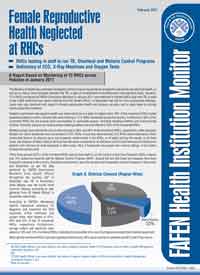The Ministry of Health has undertaken strategies aimed at improving standards of pediatric and female reproductive health, as well as to reduce communicable diseases like TB, in light of commitment to the Millennium Development Goals. However, 17% RHCs monitored by FAFEN Governance Monitors in January 2011 were deficient in trained staff to deal with TB, in spite of the 4,366 confirmed new cases collected from 62 Health Offices in December that call for more responsible attitudes.
Lacks were also observed with regard to female reproductive health and advisory services, and in steps taken to combat malnourishment in children. Pediatric and female reproductive health was observed to be in a state of neglect since 19% of the monitored RHCs lacked operational delivery rooms. Delivery kits were missing in 17% RHCs monitored across the country. Furthermore, 83% of the monitored RHCs did not provide food commodities to vulnerable groups, including lactating mothers and malnourished children. Similarly, advisory services to breast-feeding mothers were not offered in 25% of the monitored RHCs.
Ophthalmology (eye) and dental rooms were missing in 86% and 26% of the monitored RHCs, respectively, while operation theaters for minor operations were not present in 24% RHCs. It was also observed that 14% RHCs had no laboratory which means that there is no place to carry out necessary medical tests in the RHCs, or of safely storing the results. In all these cases, the absence of these medical services has the same consequence of additional cost of travel and accommodation for patients who will have to seek treatment in other areas. Also, if treatments are spread over several sittings, it will further increase the overall costs.
Thirty three percent (33%) of the monitored RHCs did not have staff to run the Control of Diarrheal Diseases (CDD) program and 15% lacked the required staff for Malaria Control Program (MCP), despite the fact that these two diseases have been frequently reported in the country. Diarrhea and dysentery were the second most frequently reported diseases in November and December, as per the data gathered by FAFEN Governance Monitors from Health Offices throughout the country (62 in December and 76 in November) while Malaria was the fourth most common disease according to data gathered from 62 Health Offices in December, nationwide.



